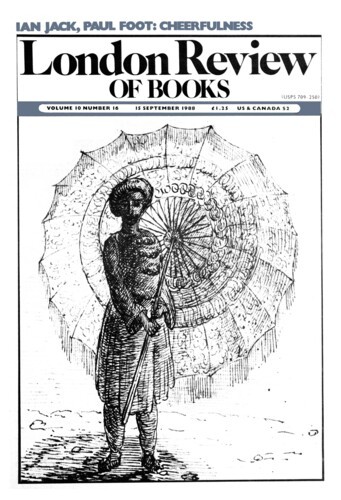Opera
Throw all your stagey chandeliers in wheelbarrows and move them north
To celebrate my mother’s sewing-machine
And her beneath an eighty watt bulb, pedalling
Iambs on an antique metal footplate
Powering the needle through its regular lines,
Doing her work. To me as a young boy
That was her typewriter. I’d watch
Her hands and feet in unison, or read
Between her calves the clear wrought-iron letters:
SINGER. Mass-produced polished wood and metal,
It was a powerful instrument. I stared
Hard at its brilliant needle’s eye that purred
And shone at night; and then each morning after
I went to work at school, wearing her songs.
The Saltcoats Structuralists
for Douglas Cairns
They found the world’s new structure was a binary
Gleaming opposition of two rails
That never crossed but ran on parallel
Straight out of Cairo. From small boys
On platform one who listened to the great
Schola cantorum of connecting rods
Dreamed-up by Scots-tongued engineers, they went on
To tame the desert, importing locomotives
From the distant Firth. New wives came out, and one,
Shipwrecked off Ailsa Craig, returned to Glasgow,
Caught the next boat; her servants had her wardrobe
Replaced in just four hours from the city shops.
Scotsmen among colonial ex-pats
They learned RP, embarrassing their families
In Ayrshire villages where they talked non-stop
About biggah boilahs, crankshawfts. Nicknamed ‘The Pharaohs’,
They never understood the deconstruction
Visited on Empire when their reign in Egypt
Ran out of steam. They first-classed back to Saltcoats,
Post-Nasser; on slow commuter diesels
They passed the bare brick shells of loco-sheds
Like great robbed tombs. They eyed the proud slave faces
Of laid-off engineering workers, lost
In the electronics revolution. Along the prom
They’d holidayed on in childhood, with exotic walking-sticks,
History in Residence, they moved
In Sophoclean raincoats. People laughed
At a world still made from girders, an Iron Age
Of Queen Elizabeths, pea-soupers, footplates,
And huge black toilet cisterns named ‘St Mungo’.
Kids zapped the videogames in big arcades
Opposite Arran. Local people found
New energy sources, poems didn’t rhyme.
The Pharaohs’ grandchildren’s accents sounded to them
Wee hell-taught ploughmen’s. In slow seafront caffs
They felt poststructuralism, tanged with salt.
Send Letters To:
The Editor
London Review of Books,
28 Little Russell Street
London, WC1A 2HN
letters@lrb.co.uk
Please include name, address, and a telephone number.

